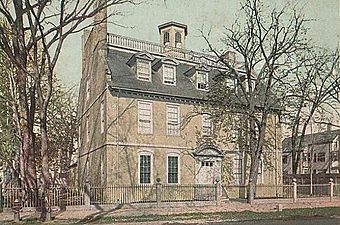MacPheadris–Warner House facts for kids
|
Warner House
|
|
 |
|
| Location | 150 Daniel Street, Portsmouth, New Hampshire |
|---|---|
| Built | 1716–1718 |
| Architect | John Drew |
| Architectural style | Early Georgian |
| NRHP reference No. | 66000028 |
Quick facts for kids Significant dates |
|
| Added to NRHP | October 15, 1966 |
| Designated NHL | October 9, 1960 |
The Warner House is a very old and important house in Portsmouth, New Hampshire. It is located at 150 Daniel Street. This house was built a long time ago, between 1716 and 1718. It is the oldest brick house in a city in northern New England. It is also a great example of early Georgian architecture, a popular style from that time.
Because of its history and unique style, the Warner House was named a National Historic Landmark in 1960. This means it is a place of special importance to the United States. It is also listed on the National Register of Historic Places. Today, the Warner House is a museum where you can learn about its past.
The Warner House is a two-and-a-half-story building made of brick. Its walls are very thick, about 15 inches (38 cm). The bricks are laid in a special pattern called Flemish bond. A decorative band, called a belt course, separates the first and second floors. The roof was changed later to a gambrel style, which has two slopes on each side. There is also a small tower, called a cupola, on the roof.
Inside, the house has a common layout for Georgian homes, with four main rooms on each floor. There is also a kitchen wing added to the back. The walls of the main hall and staircase have four special paintings. These are the oldest Anglo-American wall murals still existing in the country.
The house was first built for Captain Archibald Macpheadris. He was a sea captain from Scotland and Ireland who settled in Portsmouth. He married Sarah Wentworth, whose father was John Wentworth (Lieutenant-Governor). Captain Macpheadris passed away in 1729. After his death, the house belonged to his wife and children.
The Governor's Home
In 1737, Sarah Wentworth Macpheadris married George Jaffrey. He was a rich merchant in Portsmouth and a business friend of Archibald Macpheadris. Sarah and her daughter, Mary, moved to the Jaffrey Mansion nearby.
Sarah's brother, Benning Wentworth, was the Royal Governor of the Province of New Hampshire. He lived in the Warner House for almost 20 years. He used it as the Governor's official home. Later, Governor Wentworth moved to his country estate, which is now called the Wentworth-Coolidge Mansion. It is said that he left some broken windows at the Warner House and never paid rent to his sister.
A Family's Long History
Mary Macpheadris Osborne was Captain Macpheadris's only child who lived to adulthood. In 1760, Mary, who was a wealthy widow, married Jonathan Warner. He was a merchant from Portsmouth and also a widower. Jonathan Warner brought his eleven-year-old daughter, Mary "Polly" Warner, to live in the house.
The house was updated to fit Jonathan Warner's stylish tastes. The Warner family descendants continued to live in the house until 1932. From the 1880s until the late 1920s, the family used the Warner House as a summer home.
Saving the Warner House
In the early 1930s, the Warner House was put up for sale by the family. An oil company wanted to buy the land to build a gas station, which meant the historic house would be torn down. A group of local people who cared about old buildings, led by Edith Greenough Wendell, decided to save it.
In 1931, they created the Warner House Association. Even during the Great Depression, a very difficult economic time, the Association managed to raise $10,000. This was a huge amount of money then! They bought the house in March 1932.
A few months later, the Warner House opened as a historic house museum. At first, it had very little furniture. But over time, many of the original family furnishings were returned to the house. The Association now shares the story of the house from its very first days of private ownership up to the time it became a museum.
See also
- List of the oldest buildings in New Hampshire
- List of National Historic Landmarks in New Hampshire
- National Register of Historic Places listings in Rockingham County, New Hampshire
 | Percy Lavon Julian |
 | Katherine Johnson |
 | George Washington Carver |
 | Annie Easley |



